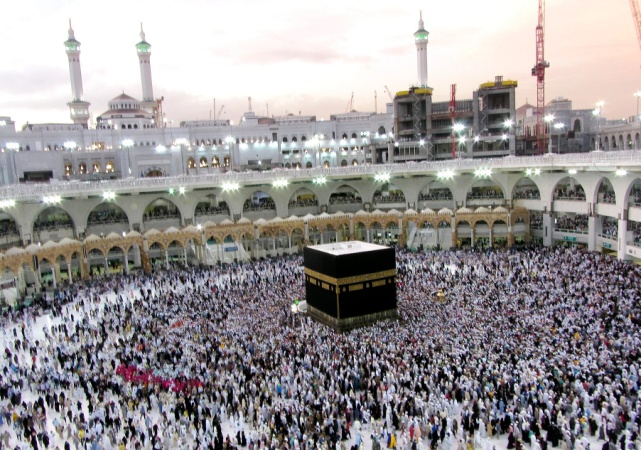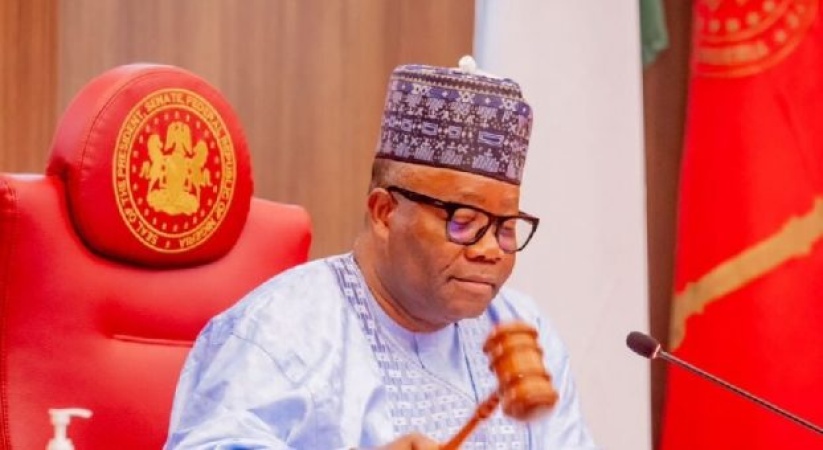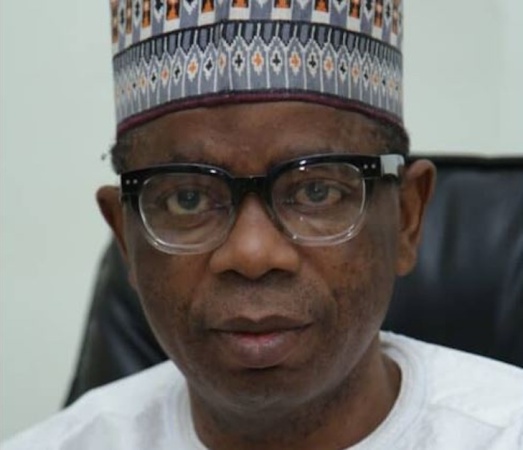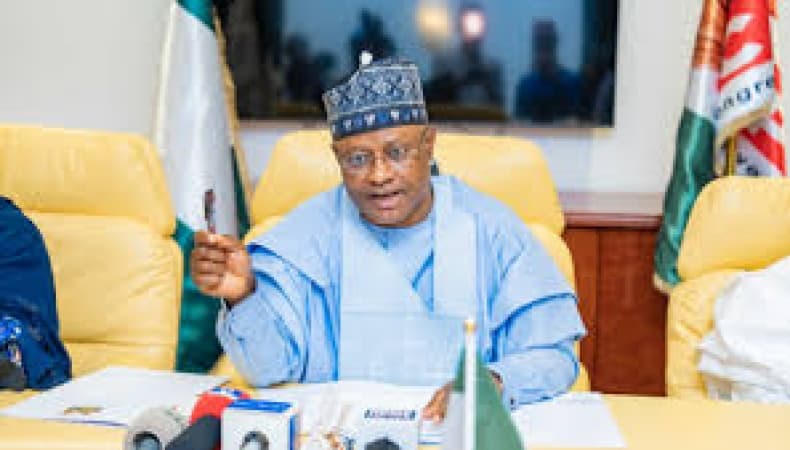

























Loading banners


NEWS EXPRESS is Nigeria’s leading online newspaper. Published by Africa’s international award-winning journalist, Mr. Isaac Umunna, NEWS EXPRESS is Nigeria’s first truly professional online daily newspaper. It is published from Lagos, Nigeria’s economic and media hub, and has a provision for occasional special print editions. Thanks to our vast network of sources and dedicated team of professional journalists and contributors spread across Nigeria and overseas, NEWS EXPRESS has become synonymous with newsbreaks and exclusive stories from around the world.

Kaduna State Governor Uba Sani yesterday restated his long-standing advocacy for state police by calling for the decentralisation of the nation?s security architecture.
He argued that the decentralisation of the security apparatus, especially the Police, would enable states to play more active roles in tackling insecurity in their respective boundaries.
He consequently urged the National Assembly to amend the 1999 Constitution to give states authority over policing, under strict regulation.
?The Federal Government alone cannot secure Nigeria. States must take proactive roles in protecting citizens, fostering inclusion, and driving development that underpins sustainable peace.
??A federated republic demands federated security,? Sani said.
?Properly legislated and regulated state police forces are not threats to unity but guarantees of it,? he added.
The governor spoke while delivering a lecture titled ?The Role of State Governments in Overcoming Insecurity in Nigeria? at the Nigerian Institute of International Affairs (NIIA) in Lagos yesterday.
His call was re-echoed by two Senior Advocates of Nigeria(SAN)?Yusuf Ali and Dele Adesina?who argued that no true federation operates a single, centralised police force.
Commending President Bola Ahmed Tinubu for supporting state-led security initiatives under the Renewed Hope Agenda, Governor Sani recalled that when he served as a Senator, he sponsored three bills seeking the decentralisation of policing and strengthening of national security governance.
He said the bills were passed by both chambers of the National Assembly but stalled at the joint Constitution Review Committee in 2019.
?That is why today we still do not have state police in Nigeria,? Sani said, pointing to overstretched federal security agencies and a police force of fewer than 400,000 personnel for over 230 million citizens.
He argued that state-led security initiatives, combined with community engagement, were critical to bridging the protection gap.
As a step towards creation of state police, all 36 governors has signed up for it at the National Economic Council (NEC) chaired by Vice President Kashim Shettima.
Governor Sani detailed Kaduna?s broader security and development strategy, which linked intelligence sharing, community involvement, and social investments in education, healthcare, transportation and infrastructure to tackle the root causes of violence.
Describing the Kaduna?s approach as ?cooperative federalism in action,? he said regular meetings of the State Security Council ensured quick responses to emerging threats.
Sani, who also reaffirmed at the lecture that the United Kingdom(U.K.) had revised its travel advisory on Kaduna State from ?Red? to ?Amber,? said that insecurity had become one of the country?s biggest governance tests.
He stressed that only a people-centred and locally-driven security framework would yield lasting peace.
He said: ?For too long, the discourse around insecurity has been dominated by federal responses, often neglecting the indispensable role of state governments.
?The solution lies in a comprehensive, multi-faceted approach, with states assuming a leading role ? not merely as intermediaries, but as architects of peace, inclusion and economic revival.?
The governor said his administration had recorded measurable progress through what he described as ?The Kaduna Peace Model? ? a framework anchored on dialogue, grassroots engagement and coordinated development.
He recalled that when he assumed office, the state was faced with banditry, kidnappings and communal conflicts. But through regular consultations with community leaders, traditional rulers, youth groups and religious figures, his government has been able to restore confidence and reduce violence in many parts of the state.
?Security is not merely the absence of violence but the presence of justice, opportunity and mutual trust,? Sani said. ?Peace cannot be imposed; it must be cultivated through inclusion and empowerment.?
Sani said the state had strengthened community policing by training and equipping vigilante groups to work alongside security agencies.
The collaboration, according to him, has not only led to the reopening of more than 535 schools previously shut due to insecurity but also revived farming and trade in rural areas.
Sani thanked NIIA?s Director-General, Prof. Eghosa Osaghae, for hosting the event, and urged collaboration among tiers of government in the fight against insecurity.
?The battle for security is fought equally in policy chambers and community halls,? he said. ?Kaduna?s experience proves that with vision, courage and partnership, insecurity can be overcome,? Sani said.
The governor added that his administration has constructed and rehabilitated over 1,300 kilometres of roads, built or renovated 1,700 classrooms, and upgraded 1,100 primary healthcare centres.
He said 255 of the upgraded centres were now operating at Level Two ? the highest in the country ? while the newly inaugurated 300-bed President Bola Ahmed Tinubu Specialist Hospital reflects his government?s commitment to human security.
?Peace, without development, remains fragile,? he said. ?Our recovery efforts are deliberately linked to infrastructure renewal and social investment.?
Sani noted that Kaduna?s religious and ethnic diversity ? once a source of division ? had now become a source of strength through sustained interfaith dialogue and inclusive governance.
He said the state had not recorded any ethno-religious crisis in the last two and a half years due to deliberate policies to promote merit, fairness and accountability.
On U.K.?s warning to its citizens desirous of travelling to Kaduna State, Sani said: ?This reclassification is not merely symbolic?it is a public declaration of confidence in our leadership and the steady hand with which we are steering the ship of state. ?
NIIA boss Osaghae lauded Governor Sani for what he described as ?a practical and experience-based lecture that connects local governance with national stability?.
Osaghae said the governor?s presentation demonstrated how subnational governments could be central to Nigeria?s long-term security reform.
?The governor?s ideas reflect the emerging consensus that states must not remain passive recipients of federal directives but active partners in national development and peacebuilding,? the DG said.
He praised the Kaduna Peace Model as a governance innovation worth studying, noting that it had combined ?grassroots consultation, inclusive dialogue and socio-economic reconstruction? to produce tangible results.
Chairman of the NIIA Governing Council, former Foreign Affairs Minister, Prof. Bolaji Akinyemi; Ambassador Suleiman Dahiru, academics and policy experts attended the event.
Akinyemi described Sani as one of Nigeria?s most notable democrats, commending his record of translating vision into action and positioning Kaduna as a national example in security management.
?Security policies not protecting citizens?
At the Gavel International Annual Lecture and Awards 2025 in Lagos, senior lawyer Ali said current national security policies have deepened human suffering and created new categories of victims.
He made the observation while speaking on ?The Impact of National Security Policies on Vulnerable Populations: A Human Rights Perspective.?
Ali warned that the nation?s counter-terrorism and law enforcement strategies have drifted perilously from their constitutional foundations, resulting in widespread violations against the very citizens they were meant to shield.
He stated that the vulnerable, including the poor, women, children and internally displaced persons (IDPs) had become unintended, yet consistent, casualties of the government?s efforts to combat terrorism, banditry, and separatist agitation.
The Senior Advocate stressed that national security cannot be pursued at the expense of human security.
He urged policymakers to adopt a people-centred approach, where human dignity forms the bedrock of every security framework.
In his contribution, Adesina described the 1999 Constitution as a fundamentally flawed document that undermines true federalism and effective governance.
He cited scholars who have variously called the document a fraud and an illogical document.
Adesina noted that despite Nigeria being a supposed federation, many of the constitution?s provisions are unitary, particularly concerning policing.
He pointed to Section 214, which mandates only one police force, and Section 215, which restricts governors? operational control over Commissioners of Police.
?How can governors be chief security officers when they lack control over law enforcement?? he queried.The SAN urged constitutional reform to correct these fundamental structural defects, insisting that no true federation operates a single, centralised police force.
Major-General James Atagura, who spoke on security issues, identified corruption and the absence of an effective system of punishment as the core drivers of insecurity in the country.
He lamented the collapse of justice and accountability, noting that widespread impunity emboldens criminality across the political landscape.
?Can anyone genuinely go to court and expect justice without bias?? he asked.
?We see election malpractice, certificate forgery, and corruption go unpunished. Governors finish eight years and vanish when the EFCC comes knocking, while their predecessors remain in court 15 years later. Without justice, society reverts to a state of nature,? he added.
Earlier, the founder of Gavel International, Mustapha Ogunsakin, urged leaders to rise above partisanship and unite against insecurity. (THE NATION)